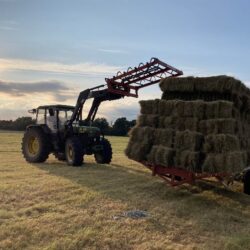
Baa, humbug when it comes to sheep!!
Many of us are accustomed to seeing sheep in our landscape but how many also appreciate that sheep helped create that landscape?
Britain was largely wooded and early settlers were responsible for creating the first fields, but not on their own. They needed assistance to keep former woodlands from their dominance. That help came from sheep. Our landscape didn’t happen by accident.
Sheep brought prosperity while helping maintain the cleared lands by nibbling down regrowth that would have seen the trees re-establish. The rolling downs we now accept as the English landscape were populated not only by sheep but also by people who grew wealthy off the backs of their animals. The wool they harvested from sheep was much-prized in the middle ages until the Spanish improved the wool quality of their breeds and ours fell out of favour. The money for the wool paid for abbeys, cathedrals, churches, and grand houses which we now regard as our heritage.
The sheep you see today are much different from the animals familiar 700 or 800 years ago. With the drop in wool’s value, a new source of income was found as sheep breeds were gradually altered to increase carcase size and meat quality. This came at the expense of wool and as most sheep farmers will tell you it now costs more to shear a sheep for its welfare than is obtained for the fleece. And that comes before the expense of transporting the worthless fleece to the British Wool Marketing Board depot where all are combined, sold, and an average price paid to producers.
Some farmers with fleeces prized by spinners, knitters, and weavers have exemption from the legal obligation to send all their wool to the BWMB and can gain real value from their fleeces, and therefore their sheep, by direct sales to private buyers.
Sheep, if they could talk, would probably have a little joke at our expense about how wool’s value has changed, something like don’t eat the hand that feeds you! Many sheep farmers will tell you that their animals have only one ambition, and that’s to die – even better if they can do it twice! But contrary to belief, sheep are not stupid. They can, for instance, remember human faces for up to two years so be careful what you do on that country walk!
Sheep, and their wool, have excellent value to us humans going forward. Some of the more primitive breeds, the Jacob, Shetland, Hebridean, and Manx Loaghtan for instance, are now opening up valued conservation areas, clearing away unwanted and rough vegetation so rare plants and habitats can flourish.
Wool is grown by sheep because it keeps them warm, it’s a great insulator. With that in mind, some want it used as a natural insulation product for our homes. It can also be ploughed in as a fertiliser. It’s all better than the woolly thinking that sees its value diminished.
If you want to know more about sheep, John Lewis-Stemple, a nature writer of magical style and also from a family who have kept sheep for hundreds of years, has written a marvellous new book, The Sheep’s Tale. It’s thin on page count, thick on information. Just right for a winter holiday read!


















